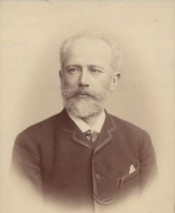
The Presidential Library reveals little-known facts about the creation of the opera “Eugene Onegin”
March 29, 2024 marks the 145th anniversary of the premiere of one of Tchaikovsky’s main masterpieces, the opera "Eugene Onegin". The composer worked on it in Russia, Switzerland, Italy, France...The work immediately won national fame, despite the composer’s doubts.
Tchaikovsky's wishes came true: the score of the opera was published before its production, and the premiere itself took place on the stage of the Maly Theater by students of the Moscow Conservatory. Nikolai Grigorievich Rubinstein conducted. A few years later, the opera traveled to all major Russian stages and, during the composer’s lifetime, was staged in Prague and Hamburg.
Ivan Sergeevich Turgenev, who attended an opera rehearsal in February 1879, wrote to Claudie Viardot, the daughter of the famous singer: “The music seemed charming to me: hot, passionate, young, picturesque, poetic...”.
The composer himself attended the rehearsals. In a letter dated March 11, 1879 to Nadezhda von Meck, a philanthropist and admirer of his talent (correspondence with N. F. von Meck is available on the Presidential Library's portal), Tchaikovsky writes: “At first I doubted whether I would go to Moscow on this occasion, but now I wanted to see the stage embodiment of my dream so much <...> that my trip to Moscow does not present any doubt”.
And finally it was March 29, 1879 - the day of the premiere of “Eugene Onegin”.
Some music critics explain the incredible success of “Eugene Onegin” by the internal state of the composer in which he was composing an immortal opera, saturated with enormous creative power, love of life, but at the same time associated with those moods of disappointment and confusion that Tchaikovsky himself experienced.
Tchaikovsky spent a long time choosing the plot for his new opera. He wrote to the composer Taneyev (letters from P. I. Tchaikovsky and S. I. Taneyev are also available on the Presidential Library's portal).
In the spring of 1877, singer Elizaveta Lavrovskaya invited the composer to write an opera based on the plot of “Eugene Onegin.” (Letters to relatives. Vol. 1. 1850–1879).
From Pushkin’s “Eugene Onegin” Tchaikovsky took for the opera only what was associated with the personal destinies, the emotional experiences of the characters, with their emotional inner world. (Letters to relatives. Vol. 1. 1850–1879).
By this time, Tchaikovsky himself finds himself in a situation similar to Pushkin’s plot. When all his thoughts were occupied only with “Eugene Onegin” especially the scene of Tatyana’s letter, he receives love messages from Antonina Milyukova, whom he had known for about five years by that time. At first, Tchaikovsky did the same thing as Onegin: his answer was a cold refusal. He was completely “buried in his composition” and so comprehended the character of Tatiana and fell in love with this image that she and all the heroes of the poem began to seem real to him. Tchaikovsky admitted that as much as he loved Tatyana, he was so terribly angry with Onegin, whom he saw simply as a “cold, heartless fop”. When Pyotr Ilyich received another letter from Antonina, he realized how heartless he was towards the girl who fell in love with him: “I myself acted incomparably worse than Onegin”.
Tchaikovsky married in the summer of 1877, but soon his relationship with his wife reached a dead end. He is having a hard time with the current situation, and he even has thoughts of suicide. At the end of the year, Tchaikovsky leaves for Switzerland. During this period, only creativity becomes his main need and salvation. (Letters to relatives. Vol. 1. 1850–1879).
After the death of Pyotr Ilyich Tchaikovsky, Antonina Milyukova wrote memoirs that were published on the pages of the Russian Musical Newspaper in October 1913, in an issue dedicated to the 20th anniversary of the composer’s death.
More facts about the opera “Eugene Onegin” and other works of Pyotr Ilyich Tchaikovsky, as well as about the life path of one of the greatest composers in the history of music is available in the electronic collection of the Presidential Library Pyotr Tchaikovsky. 1840–1893, which includes correspondence, books and articles about his career, digital copies of the composer’s autographs, sheet music and photographs with his dedicatory inscriptions.









